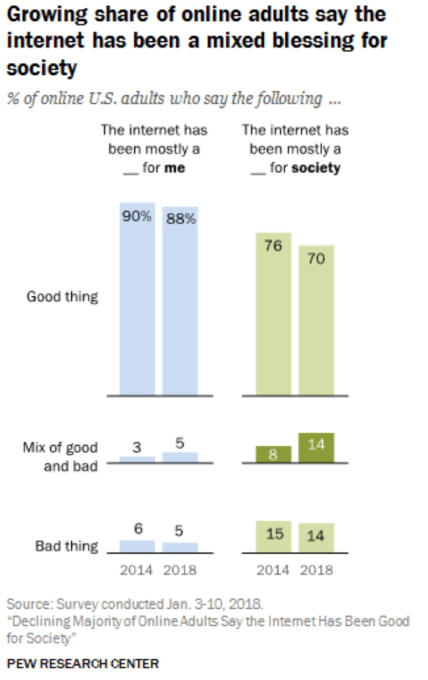Majority of U.S. adults still think the internet is ‘mostly’ good for society – but that number is falling
A growing number of U.S. adults no longer view the internet as a largely “good thing” for society, according to a new report from Pew Research Center out today. To be clear, a sizable majority – 70 percent – continue to believe the internet’s development has been mostly good. But that number has dropped by 6 percentage points since 2014, the study finds. Meanwhile, more adults now perceive the internet – perhaps more accurately – as something of a mixed bag. That number has climbed from 8 percent in 2014 to now 14 percent, Pew says.
However, the group of those who believe the internet is mostly a “bad thing” for society hasn’t changed much over the years. Those who can’t see the upside to global connectivity, has gone from 15 percent in 2014 down to 14 percent in 2018, which isn’t a notable difference, statistically.
Pew attributes the decline in the positive sentiment to the reactions from older Americans, and particularly seniors who have come online in growing numbers in recent years. According to data released by Pew last May, for example, Americans 65 and older now account for 15 percent of the overall U.S. population. And by 2050, 22 percent of those 65 and older will be online.
Like most Americans, the large majority of the senior group still feels the internet is mostly a good thing – but that number has dropped 14 points from 78 percent in 2014 to 64 percent today.
In addition to seniors, a smaller number of younger U.S. adults today believe that the internet is “mostly good.” While again, that sentiment is still held by the large majority by far – 74 percent say this is their opinion – that number has fallen from 79 percent in 2014.

Pew’s report didn’t detail why more U.S. adults are increasingly ambivalent about the internet. Instead, it focused on the reasons cited by the group who claims it’s “mostly bad.” (Presumably, these sentiments are shared by those who now believe the internet isn’t mostly good.)
The adults who think the internet is “mostly bad” had a large list of grievances, as it turned out. And their top concerns are somewhat surprising.
A quarter of the internet’s naysayers cited its paradoxical ability to isolate people even as it connects them – saying it leads to people spending more time with devices instead of with other people.
16 percent mentioned the problems related to the spread of misinformation and fake news, and 14 percent were concerned about the effect the internet has on children. Another 13 percent said it encourages illegal activity.
Only a small share – 5 percent – were worried about their privacy and their personal information being shared online.
That small percentage focused data privacy concerns is interesting – especially in the wake of the Cambridge Analytica data privacy scandal, where the personal data of some 87 million Facebook users was hijacked without their knowledge or consent. Instead, Pew’s data seems to imply that people are generally more upset about the cultural and emotional impacts attributed to the internet, rather than having their personal data stolen or misused.
Maybe that’s because personal data has already been stolen time and time again, through security breaches at places like Yahoo, Equifax, Target, Home Depot, JP Morgan Chase, Anthem, and others. Or maybe it’s because users have a hard time identifying or understanding the real-world impacts of personal data breaches, unless it leads to some concrete changes – like identity theft or targeted harassment. Or maybe people already assume the days of personal privacy online are long dead, and just shrug their shoulders at new reports of yet another breach of trust with a fatalistic, “oh, who was it this time?”
In any event, it’s already been observed that the fallout from the Facebook scandal has been minimal, in terms of user behavior. There have been no sizable changes on that front, including user-initiated changes to privacy settings and sharing, The Wall Street Journal recently reported. In addition, Facebook just surprised investors by reporting continued user growth and beating earnings expectations.
Pew’s data supports the idea that more users seem to think – despite everything that’s happened – the internet is still mostly a good thing. And if there are concerns, they’re around its ability to lessen our connections to others – because we’re spending too much time online, fighting about information because we read different sources, or because we’re worried how it’s impacting our kids.
Meanwhile, those with a more positive take on the internet cited reasons like how it makes information much easier and faster to access (62% said this). 23 percent saw its networking benefits as a largely good thing – including connecting with others, and keeping up with friends and family.
Unrelated to perceptions about the internet, Pew also reported today that one-in-five Americans (20%) are now “smartphone only” internet users at home – meaning, they don’t subscribe to broadband. This is up 7 percent from 2015.
The figure is associated with those living in low-income (<$30K/year) households and those who are less likely to have attended college – it’s not some sort of reaction to concerns about the internet’s impact.
from TechCrunch https://ift.tt/2rbgmcV
via IFTTT
Comments
Post a Comment